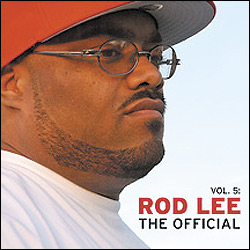ROD LEE
Vol. 5: Rod Lee—The Official
(Club Kingz/Morphius Urban)
DJ LIL JAY
Operation: Playtime
(Club Kingz/Morphius Urban)
Beat lovers outside the Baltimore/D.C./Philly axis of evil have been given a gift. For the first time ever, Baltimore club tracks are readily available to any Tom, Dieter, or Harumi blessed with a cool-ass record store beyond the mid-Atlantic region. The Morphius Urban imprint (Morphius Records is home to such OG rap crews as Da Homosexuals and Pere Ubu) and Club Kingz Records have released for worldwide distribution two cracking new mix CDs by Rod Lee, one of the progenitors and star makers of the style known as Baltimore club music, and by Rod’s 14-year-old protégé, DJ Lil Jay.
The Baltimore club sound, a northern cousin to Miami bass that’s heavy on kick drums, ancient breakbeats, and mind-alteringly repetitive vocal samples, and cross- pollinated with bounce, crunk, R&B, and anything else that will move a crowd, has always been localism incarnate—local clubs, labels, shops—for two reasons: One, if you sample the Dixie Cups and old Motown 45s in the forest, will anyone sue you? And two, what, exactly, is wrong with hangin’ in Baltimore? On the Morphius mixes, most of the rampant sampling has been scrubbed, making a frequently minimal music even more bare-bones. Lil Jon is everywhere on both discs, though. Mickey Mouse will probably be enslaved in a Florida swamp for generations, but Jon’s exhortations have already passed into the public domain.
No offense to Rod Lee, who co-engineered the Baltimore club sound with DJ Technics and a handful of others, and whose Vol. 5 (featuring 30 tracks, 20 of them his own) is fierce, funny, and crushing and should push the sonic development of the Baltimore style up a notch. (In this case, that means everything old is new again—love the squelchy 303 acid sounds on K.W. Griff’s “Your Hood.”) But it’s his teenage cohort Lil Jay—an infant when Frank Ski and the late Tony Boston (aka Ms. Tony) transformed deep house into their own raunchy and doo-doo-riffic hip-house B-More blend courtesy of cuts like “Whores in This House” and “Pull Ya Gunz Out”—who brings home the bacon with a near-perfect mix. Rod can be single-minded in his pursuit of the ultimate body slam, so Jay’s mix does a better job of expressing the depth and breadth of the club sound at its best. Tracks like Samir’s “Club Africa” and DJ Manny’s “Down the Hill” (featuring Jay on vocals) are hypnotic, propulsive, addictive, and eerily beautiful in the least expected places. Jackhammer beats, Eamon homages, dusty breaks (man, Baltimore cats are in some kind of love with the drum break from Lyn Collins’ “Think [About It]”—it would bring a tear to Rob Base’s eye), block politics, and synth-horn stabs played in the key of dance your ass off. Hats off to Morphius for spreading the word that you don’t have to import your rumptastic noize from Brazil. It’s been right here all along. SCOTT SEWARD
LIMP BIZKIT
The Unquestionable Truth, Pt. 1
(Flip/Interscope)
OASIS
Don’t Believe the Truth
(Sony)
Two white-boy dream-pop bands trying to reverse their commercial slides by identifying with an adolescent fixation on the nature of reality, as reflected in their album titles. Even mentioning Limp Bizkit’s record is fucking with their unorthodox marketing plan (no promotion, no publicity, selling as few copies as possible), but their CEO is a master of short-fuse comedic frustration, so it’s always worth it to upset him. (Although NOT by going as far as circulating videos of Durst’s wurst. Please, put it away.) Fair enough if The Unquestionable Truth remains an “unknown pleasure,” since returning good-cop guitarist Wes Borland’s low-end latticework makes it into what would’ve been the 19th Joy Division album, had the latter not changed their name and hired a keyboard player—”The Truth” lifts the sepulchral feel of JD’s “24 Hours,” the title of which describes how long the album feels, even though it only lasts 29 minutes. Meanwhile, Oasis, England’s answer to Creedence Clearwater (brothers plus voice plus squared-choogle thump), release their third straight Mardi Gras—meaning that everyone gets to do a song. One misses the cocaine colossus of earlier times, but Oasis are following the path of English bands who start off with monolithic purpose before making albums of fragments and vignettes—fans of Muswell Hillbillies, The Who by Numbers, and Goats Head Soup should enjoy this. (“Mucky Fingers” is a Some Girls–style Lou Reed telephone conversation, but has too many chord changes to pull off that real Warhol Factory sound.) “Let There Be Love” takes a title from another New Beatles of days past—the Australian ones who left Pepperland for the 2001 Odyssey disco. Oasis might consider moving to Miami and pumping up the bass for the next album, because right now they’re just staying alive. DAVE QUEEN




